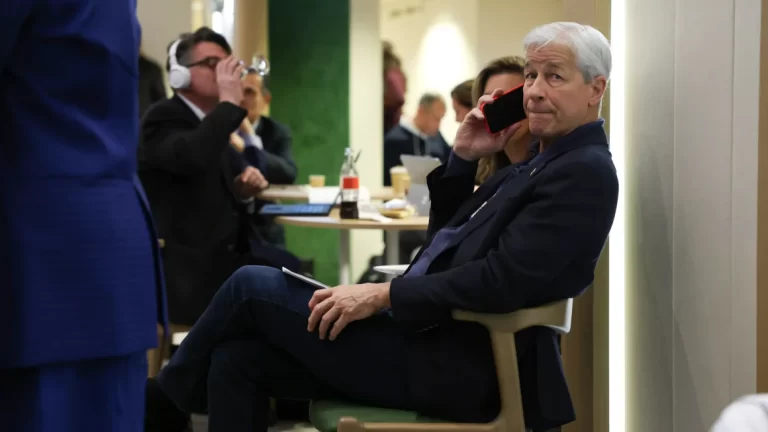Jamie Dimon believes artificial intelligence will have a huge impact on global business this year.
Dimon, one of the world’s most influential business leaders, said in his annual shareholder letter Monday that while he doesn’t yet know the full effect AI will have on business, the economy or society, he knows its influence will be significant.
“We are completely convinced the consequences will be extraordinary and possibly as transformational as some of the major technological inventions of the past several hundred years: Think the printing press, the steam engine, electricity, computing and the Internet, among others,” the JPMorgan Chase (JPM) CEO wrote in the letter.
The AI explosion has already transformed workplaces across the world and nearly 40% of global employment could be disrupted by AI, according to the International Monetary Fund. Industries from medicine to finance to music have already felt its effects.
Shares of companies associated with the AI boom have soared. Chipmaker Nvidia (NVDA) is up more than 219% over the last 12 months, while Microsoft (MSFT) is up nearly 50%.
JPMorgan, the world’s largest bank by market capitalization, is exploring the potential of generative AI within its own ecosystem, said Dimon. Software engineering, customer service and operations and general employee productivity are all getting AI makeovers.
“Over time,” wrote Dimon, “we anticipate that our use of AI has the potential to augment virtually every job, as well as impact our workforce composition. It may reduce certain job categories or roles, but it may create others as well.”
JPMorgan’s organization now includes more than 2,000 AI and machine learning experts, and the bank recently announced a new position for a chief data & analytics officer that sits on their operating committee.
Dimon also recognized the risks that come with the AI boom. “You may already be aware that there are bad actors using AI to try to infiltrate companies’ systems to steal money and intellectual property or simply to cause disruption and damage,” he wrote.
In January, JPMorgan said it had seen a sizable increase in daily attempts by hackers to infiltrate its systems over the last year, highlighting the escalating cybersecurity challenges the bank and other Wall Street firms are facing.
JPMorgan Chase, the largest US bank by assets, now invests $15 billion a year and employs 62,000 technologists to, in part, help fortify its defense against cyber crimes.
First Republic purchase
JPMorgan acquired most of First Republic’s assets last May after the San Francisco-based regional bank was seized by the government. It marked the second-biggest bank failure in US history.
The fall was part of the collapse of three US regional lenders last spring that left financial institutions and regulators scrambling to prevent the spread of a banking crisis.
“When we purchased First Republic in May 2023 following the failure of two other regional banks, Silicon Valley Bank (SVB) and Signature Bank, we thought that the current banking crisis was over,” Dimon wrote on Monday.
Only those three banks, he said, had the “toxic combination” of extreme interest rate exposure, large unrealized losses and highly concentrated deposits. But he warned, if interest rates increase or there is a recession, “there will be plenty of stress — not just in the banking system but with leveraged companies and others.”
Inflationary worries
Dimon warned investors once again that the US “may be entering one of the most treacherous geopolitical eras since World War II.” While key economic indicators appear to be strong and inflation rates are easing, he sees many potential risks.
“All of the following factors appear to be inflationary: ongoing fiscal spending, remilitarization of the world, restructuring of global trade, capital needs of the new green economy, and possibly higher energy costs in the future (even though there currently is an oversupply of gas and plentiful spare capacity in oil) due to a lack of needed investment in the energy infrastructure,” he wrote.
Markets are currently pricing in a 70% to 80% chance of a soft landing, where inflation is tamped down without triggering an economic downturn. Dimon wrote those odds are far too optimistic. Traders, he said, are paying too much attention to the monthly machinations of the Federal Reserve and not enough attention to longterm geopolitical and policy risks.
“There seems to be an enormous focus, too much so, on monthly inflation data and modest changes to interest rates,” he wrote. Instead, investors should be thinking about what might happen a year or two from now. “Small changes in interest rates today may have less impact on inflation in the future than many people believe,” he said.
Dimon has previously spoken out about his fears regarding high levels of US debt, fiscal stimulus and deficit spending, as well as the effects of quantitative tightening.
“The impacts of these geopolitical and economic forces are large and somewhat unprecedented,” he wrote. “They may not be fully understood until they have completely played out over multiple years.”


